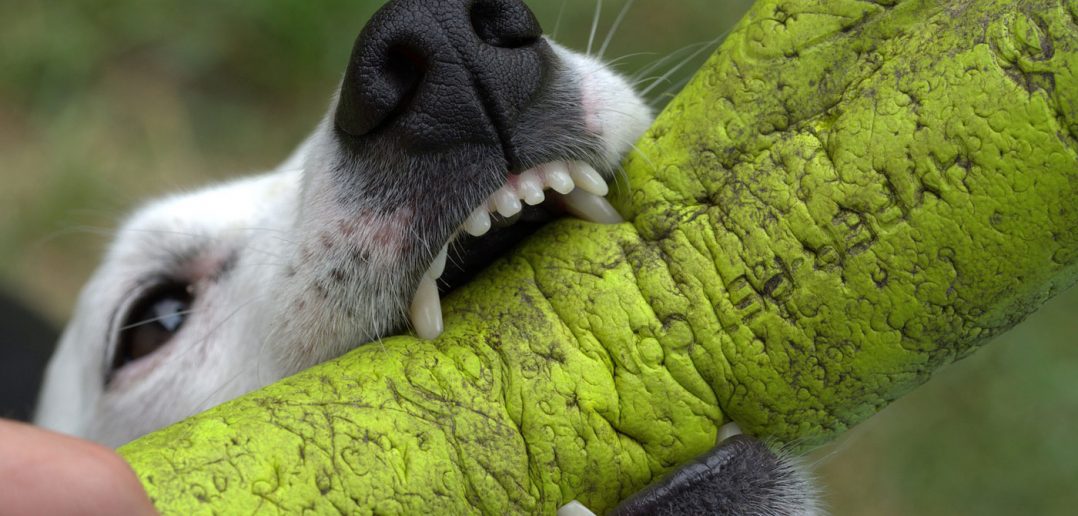Dogs are man’s best friend. But sometimes even friends can quarrel. If you find yourself in a tussle with a pup, chances are you’re not going to get punched in the jaw, you’re going to get scratched … and bitten.
Let’s take a look at just why dogs tend to favor using their teeth and what to do if you, or someone you’re with, has an unpleasant run-in with some canine’s canines.
Why Dogs Bite
There are many reasons that dogs might bite a person, with pure aggression being just one of the different options. Here are a few of the top bite-causing scenarios.
- Fear
If your dog is afraid of something, it can bite out of pure, unadulterated fear. If this is the case, you’re going to want to remove the source of the fear as quickly as possible and try to provide comfort or a distraction. - Excitement
Just like a 5-year-old kid who jumps on dad too hard when they get all riled up, your dog can get overly excited and bite out of fun. While they see it as nothing more than simple play, the recipient of the bite can find it cause enough for a time out. - Pain
If a dog is in pain, they may lash out at anyone that attempts to interfere. This goes for those they love as well, so be careful when helping a suffering pup! Keep your dog happy and healthy to reduce risks of bites! - Alpha Pup
One of the more cheeky causes for a bite from a canine can come from the fact that they’re challenging you. It’s why one of the classic elements of training a dog involves showing them who’s the alpha. If your dog doesn’t get the message, they may give you a nip just to show you who they still think is in charge. - Surprise
Sneaking up on a dog is a sure way to get an unexpected wound, as one of their natural reflexes when surprised is to bite at whatever it is that got the jump on them. - Protection
It’s the classic guard dog scenario. If you’ve got a fiercely loyal dog, especially with a family, chances are they’re going to go into “guard dog mode” if they feel that anyone they love is threatened. While this can be helpful if there’s a burglar in the house, though, you don’t want them going off on Uncle Franky at Thanksgiving just because they don’t like his vibe. - Aggression
Finally, there’s the poster boy of dog bites: pure aggression. Some dogs are simply aggressive by nature. If that’s the case with your dog, you’re going to want to keep a tight hand on that leash whenever an opportunity for biting comes around.
Who Dogs Bite
While the obvious answer here is that dogs can bite anyone, there are a few candidates that most canines tend to choose more often than others.
For example, children can be more likely to get bit since they are less likely to be viewed as alphas. A dog may try to nip at a child as a sign that they think they themselves are the higher on the pecking order, even if they know the buck stops with you. It’s worth taking the time to have children train with your dog in order to establish everyone’s place on the ladder of authority.
Postal workers are another common target. In 2016 alone the United States Postal Service reported that a whopping 6,775 employees were attacked by dogs. Yikes!
What To DO: The Skinny on Dog Bites
If you find yourself or someone around you bitten by a dog, you’re going to want to address the issue immediately, even if it doesn’t look serious.
Why a Dog Bite is Dangerous
A canine’s teeth can go deep, leaving a genuine concern for infection to follow. Even if the wound seems superficial, it doesn’t mean you’re out of the woods. The bacteria from a dog’s mouth can infect even shallow wounds.
On top of the obvious threat of infection, there can also be neurological damage, head injuries due to being knocked over, and the extreme case of a loss of a finger, limb, or other extremity if the attack is serious.
How to Treat a Dog Bite
The latter concerns such as neurological issues, head trauma, and other extreme cases are obvious reasons to call an ambulance or at the least head to a hospital or urgent care center to get checked.
As far as your average dog bite goes, there are a few important things you’re going to want to do.
- Press on the wound gently in order to help flush out any bacteria inside.
- Then wash it with warm soapy water.
- If the bleeding is serious, use a clean towel or cloth to help slow it down.
- Once the bleeding has slowed down, use a bandage and antibiotic cream.
- Make sure to keep the wound clean and change the bandage multiple times a day.
Even if you think you’ve cleaned the bite well, it is still worth the time to head to a medical professional to get the all clear. It can save you a world of pain and trouble down the road if it prevents things from developing into an infection.
A Note on the Law
Dog bites are a treasure trove for lawsuits, regardless of whether they come from a place of aggression or fear. However, there are a few poignant things to keep in mind regarding this aspect of things.
Lawsuits are a costly affair, even if you’re the one doing the suing. Remember, getting a minor bite from a dog is hardly provocation to start a huge legal battle that will likely end in your financial loss from the fees alone. On the other hand, it’s not unreasonable to expect things like hospital bills to be covered by the dog owner.
If you are the dog owner, on the other hand, there are still laws that can help keep you and your pooch safe in some cases. Many states have the “one bite rule” which allows unsuspecting owners of previously non-aggressive dogs to simply pay for medical bills if a bite is just a minor one. If a dog is naturally aggressive or a repeat offender, though, chances are you’re looking at some hefty fines and possibly having to put your dog down as well.
The best case scenario is obviously to avoid a bite from ever happening in the first place. It’s worth taking the time to socialize your dog with both humans and other dogs in order to help them learn how to behave around strangers. But should a bite unfortunately occur, you will know how to treat the wound in order to avoid infection.
Featured Image by Meli1670 on Pixabay.




